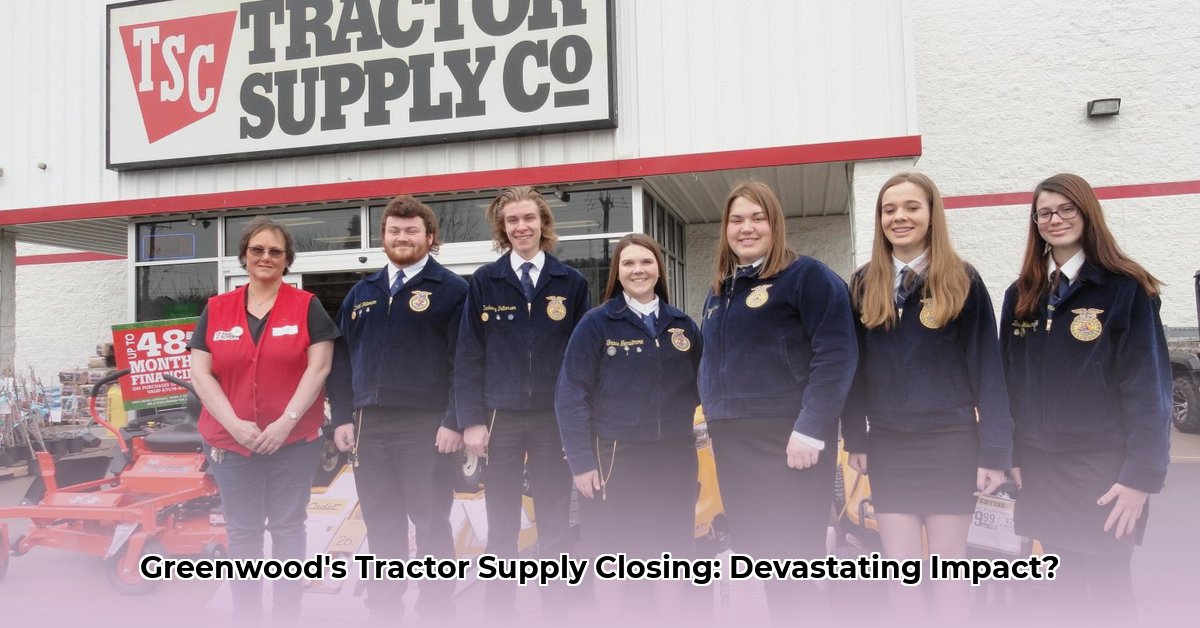
The Unexpected Shuttering: A Small Town's Big Loss
The Tractor Supply store in Greenwood, Mississippi, closed unexpectedly on [Insert Date if Available], resulting in immediate job losses and significant disruption to the local agricultural community. This closure highlighted the vulnerability of rural economies reliant on a limited number of key businesses. The immediate impact included the loss of employment for store staff and the disruption of supply chains for local farmers. For more information on this specific closure, see this Greenwood Tractor Supply.
Understanding Greenwood: Agriculture's Heartbeat
Greenwood's economy is deeply intertwined with agriculture. Farming has been the cornerstone of its livelihood for generations, shaping its culture and economic structure. The Tractor Supply store, strategically positioned to cater to the needs of the farming community, served as a vital link in the local agricultural supply chain. Its closure signifies a potentially significant disruption to this established system.
Unraveling the Mystery: Why Greenwood's Tractor Supply Closed
While precise internal data regarding Tractor Supply's decision remains unavailable, several factors likely contributed to the closure. These are not mutually exclusive and likely acted in concert.
Competing Forces: A Confluence of Challenges
Economic Downturn: Fluctuations in agricultural markets and broader economic challenges in rural areas likely impacted the store's profitability. Reduced farmer spending, driven by tighter budgets, could have played a significant role.
E-commerce Competition: The increasing convenience and often lower prices offered by online retailers likely shifted consumer behavior away from the physical store, especially amongst younger farmers more comfortable with digital platforms. This is a trend impacting many brick-and-mortar businesses nationwide.
Internal Company Decisions: Tractor Supply may have conducted internal analyses that deemed the Greenwood location unsustainable, potentially prioritizing more profitable stores or implementing a revised strategic plan.
The Wider Impact: A Community Feels the Pinch
The ramifications of the closure extend far beyond the immediate loss of jobs and shopping convenience. Farmers now face increased transportation costs, longer travel times to access necessary supplies, and reduced operational efficiency. These added expenses severely strain already-tight profit margins. Moreover, the loss of jobs contributes to economic hardship for families within the Greenwood community, diminishing overall spending power. Reduced local tax revenue will further impact the city’s capacity to provide essential services. The ripple effect destabilizes the local economy and the agricultural sector that supports it.
Charting a Course Forward: Recommendations and Actionable Steps
Addressing the consequences of the Tractor Supply closure requires a proactive, multi-stakeholder approach. The following recommendations outline steps for mitigating future challenges and supporting the long-term viability of Greenwood's economy.
Diversification for Farmers: Farmers should diversify their supply sources, exploring local cooperatives, online retailers, and alternative suppliers. They should also consider strategies for diversifying their income streams, such as exploring agritourism or farmers' markets.
Strategic Reassessment for Tractor Supply: Tractor Supply should conduct a thorough post-mortem analysis of the Greenwood closure, incorporating quantitative data on sales trends, market demographics, and comparative performance with similar rural locations. This will inform future rural market strategies and potentially prevent similar closures.
Proactive Community Engagement: Greenwood's city council should actively engage with local businesses, evaluate the economic impact of the closure, and explore incentive programs to attract new businesses that support the agricultural sector and enhance local retail options. Community workshops to facilitate improved communication between farmers, suppliers, and local policymakers will be essential.
Investing in Rural Infrastructure: State and federal governments should assess the need for improved rural infrastructure, including transportation systems and broadband internet access, to facilitate efficient supply chain operations and enable better access to e-commerce for both businesses and consumers.
A Broader Conversation: The Future of Rural Retail
The Greenwood Tractor Supply closure serves as a stark reminder of the precarious position of rural retailers. The confluence of economic challenges, shifts in consumer behavior, and the pressures of e-commerce necessitates innovative solutions and supportive policies to strengthen rural economies and ensure the continued vitality of rural communities. The case of Greenwood underscores the pressing need for collaborative efforts between local governments, businesses, and agricultural producers to create a more resilient and adaptable economic landscape. Further research into the specific factors influencing rural retail success or failure is essential to inform future strategies.